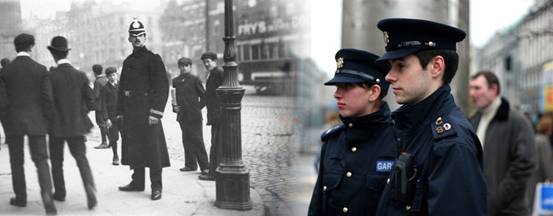
The tradition of organised policing in Ireland can be traced back to the establishment of the County Constabulary in 1822. The County Constabulary was a uniformed police force formed on a regional basis.
Before this there existed a basic police force known as The Peace Preservation Force. This had been set up in 1816 through an act of the Westminster Parliament. This act was sponsored by Robert Peel, the Chief Secretary for Ireland.
In 1836 the Irish Constabulary (later to be known as the Royal Irish Constabulary (RIC)) and the Dublin Metropolitan Police (DMP) were established to replace the County Constabulary. By 1900, the RIC had roughly 11,000 men stationed in about 1,600 barracks. Attacks on the RIC were widespread either in their barracks or while on patrol. Eamonn DeValera and other members of the Sinn Féin Government, “Dáil Éireann” which claimed to be ruling Ireland in absentia, urged the shunning of the RIC and their families as agents of a foreign power. Widespread resignations from the RIC followed.
Following the Civil War and the truce of July 1921 the RIC disbanded and a new police force, “The Civic Guard” (renamed the Garda Síochána na hÉireann on 8 August 1923) was formed by Michael Collins and the Irish Government. The DMP merged with An Garda Síochána in 1925.
Dublin Castle, the centre of British Rule in Ireland for nearly 700 years was formally handed over on August 17, 1922 when Commissioner Michael Staines led his new police force through the castle gates. Five days after the hand-over of Dublin Castle, Michael Collins, who orchestrated the demise of the RIC and the creation of the Civic Guard was shot dead at Béal na mBlath.

